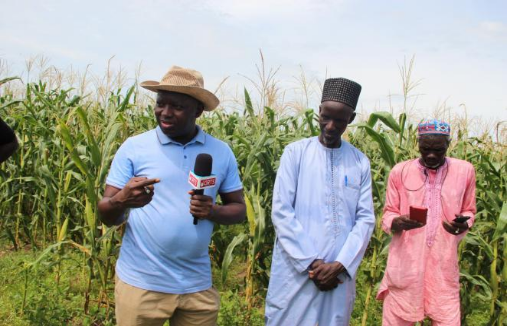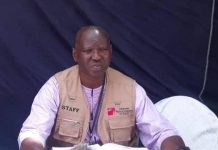By: Kebba AF Touray
Mod Secka, Permanent Secretary at the Ministry of Agriculture, has reaffirmed the Gambia Government’s commitment to the attainment of food and nutrition security, sustainable socio-economic growth, and shared prosperity.
Mr. Secka made this remark during a five-day nationwide joint monitoring mission to intervention sites of the six active agriculture projects being executed by his Ministry and implemented by the Central Projects Coordinating Unit (CPCU), a body responsible for overseeing the implementation of all agricultural projects in the Gambia.
The mission by the Senior Management of the Department of Agriculture and key stakeholders was designed to gather firsthand information on field activities and to assess the impact of project interventions on target beneficiaries.
The team led by Mr. Secka, comprised the Coordinator of the CPCU; Projects Directors; Monitoring and Evaluation Specialists; Director General of the Department of Agriculture; Director General of the Gambia Livestock Marketing Agency; senior staff of NARI; officers of the Department of Livestock Services and the National Seed Secretariat.
The team visited 28 intervention sites supported by various projects including the World Bank-funded Gambia Inclusive and Resilient Agricultural Value Chain Development Project (GIRAV), Islamic Development Bank-funded Small Ruminant Production Enhancement Project (SRPEP), the Rice Value Chain Transformation Programme (RVCTP), the African Development Bank (AfDB) funded Gambia Agriculture and Food Security Project and the AfDB / BADEA funded Regional Rice Value Chain Development Project (RRVCDP), and The Resilience of Organizations for Transformative Smallholder Agriculture Project (ROOTS), which is co-funded by the International Fund for Agricultural Development (IFAD); OPEC Fund for International Development; GEF Least Developed Countries Fund; French Development Agency (AFD); Government of The Gambia and project beneficiaries.
During their interaction with the team, farmers expressed gratitude to the Government, the Ministry of Agriculture, and the implementing agencies of the projects for the life-changing interventions. They explained that because of the support being provided by the projects in the form of free seed and subsidized ploughing services and fertilizer, they have been motivated to increase the areas utilized to cultivate rice, maize, cowpea, and groundnuts, and expressed optimism for a bumper harvest. They, however, singled out limited and timely access to ploughing and threshing machines as a major challenge and appealed for support from the government.
Speaking at the sites visited, Mr. Secka observed with appreciation the performance of crops as well as the implementation status of other sub-projects. He thanked farmers for making good use of the project’s interventions and urged them to take full ownership of the investments. Secka encouraged farmers to reserve their own seeds for the next cropping season from their produce, saying that project interventions are time-bound.
Mr. Secka also enjoined the Regional Governors to also promote the adoption and production of climate-resilient crops on a large scale, in order to contribute to increased agricultural production and productivity.
Responding to calls for support with farm implements such as seeders, tractors, and threshers, Mr. Secka advised Project Directors to procure more light equipment such as power tillers, seeders and threshers to enable farmers access services on time to help scale up production of drought and salt tolerant, early maturing and high yielding rice varieties, in order to accelerate the achievement of the national drive for self-sufficiency in rice by 2030. He also said that the growing poultry industry provides a good opportunity to scale up maize production.
Responding to concerns raised by poultry farmers concerning the limited market for their produce, particularly eggs due to the cheap imports, Mr. Secka noted their worries and informed them that he would meet with the relevant stakeholders during the first week of October to discuss the issue and explore alternatives with a view to addressing the problem in a progressing manner. He, however, encouraged them to form cooperatives and establish contacts with local farmers so that they could buy the surplus maize grains, which helped to cut down on their expenditure on the importation of maize for poultry feed.
Mr. Secka also disclosed that his Ministry is in the process of rolling out a dairy farming pilot project from early 2024, as part of the agriculture transformation agenda to promote the creation of jobs and wealth, as well as to improve food security and nutrition. He called on beneficiaries of livestock pasture/feed gardens provided by SRPEP to ensure the proper management of sites as well as to scale up production to improve the availability of livestock feed in order to reduce farmers’/herders’ conflict.
For their part, the Coordinator of the CPCU and the GIRAV project, Abdoulie Touray, and the Directors of the other projects all reiterated their commitment to the improvement of the lives and livelihoods of farmers. They all assured farmers that their concerns were noted and that the projects would ameliorate them in the short, medium, and long term and further asserted the need for farmers to take ownership of the projects to ensure their sustainability beyond their time limit.




















